Game of Thrones 3.04/3.05: And Now His Watch Has Ended/Kissed By Fire
Apologies for this week’s lateness and last week’s lack of a post. Things have been hectic due to finals and graduation. As a result, here’s a special double post for the last two episodes. Regular Monday postings will resume tomorrow.
SPOILER WARNING: Whether you’ve read all five books or only watch the series this post is for you. I have read the books (multiple times) but I will not go beyond the scope of the TV series (save a wink or a nod every now and then that only my fellow readers will catch on to). All events that have occurred in the TV show up to and including yesterday’s episode are fair game. You’ve been warned.
Note: With the biggest cast in television it can be hard to keep all the names and faces straight. Thus the first mention of each character contains a link to a picture of them which will open in a new tab.
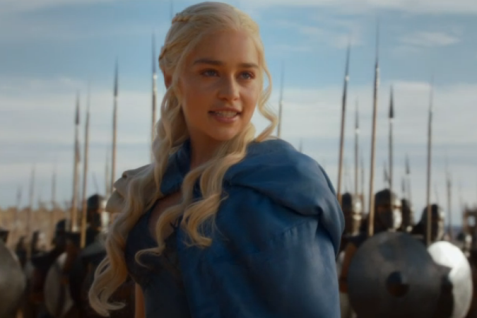
Dracarys
We only saw Dany for a short time in “And Now His Watch His Ended,” but what a time it was. She hands the slave master Kraznys the chain holding Drogon, the largest and most fearsome of her dragons. He in turn hands her the whip which symbolizes control of the thousands and thousands of Unsullied before her. Once the whip is in her hand, the Unsullied immediately follow her various simple orders: march forward, stop. Kraznys finds himself in much the opposite scenario, though he holds Drogon’s chain, he does not hold Drogon. He complains to Dany in High Valyrian, who turns to tell him “A dragon is not a slave,” revealing in one line both facets of Dany’s deception: First, she’s understood Kraznys all along. The Targaryens are of the blood of Old Valyria, and Valyrian is her mother tongue. Second, she agreed to hand Drogon over knowing full well he would never submit to another master. Unlike slaves, bond and ownership can not be transferred with a chain or whip. She then commands the Unsullied to “slay the masters, slay the soldiers, slay every man who holds a whip, but harm no child. Strike the chains off every slave you see!” Finally realizing his blunder, Kraznys attempts to regain control of the Unsullied, commanding them to kill her, but they belong to Dany now. Once again, she turns to say that word of great destruction, “Dracarys.” Boom. Roasted. Thus were the slaves of Astapor freed and the city burned, with Dany losing nothing and gaining an army in the process. Perhaps she’s finally on her way to Westeros?
In the books, this was one of those moments you stood up, paced around, puffed out your chest, and pumped your fists, and it translated in the show. In the books especially, it felt like the first time Dany had done anything, let alone anything awesome, in forever. The writers did what they could to inject some life into her season two storyline, but it still often felt like a distraction, time wasted in Qarth that could’ve been spent in Westeros. So seeing Dany say dracarys and the chaos that followed had much the same effect.
Furthermore, the scene symbolized both of the episode’s major themes. The first being rising up against one’s oppressors (at times a variation of the hunter becoming the hunted), and the second being the dangers of underestimating and/or misreading people. In this case at least I don’t think either requires much explanation (which is why I chose to begin with it). In the former case, slaves kill their masters. Done. In the latter, Kraznys thought he was conman when in fact he was the victim. That’s got to, ahem, burn.
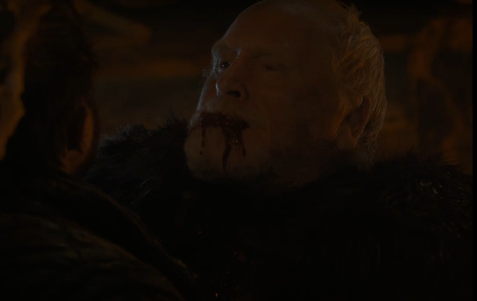
Mutiny in the Watch
The aforementioned themes of “And Now His Watch Has Ended” were prevalent in the Night’s Watch storyline as well. It begins with a funeral for a brother named Bannen (no picture as we never actually met him in the show). Remember the words of the oath of Night’s Watch, “It shall not end until my death.” Thus the eulogy for Bannen, and all brothers of the Watch, conclude with “And now his watch is ended.” At first glance, this is the source of the episode’s title, but only at first glance.
The grumbling begins during the funeral, after Grenn notes he “didn’t think a broken foot could kill a man.” Rast replies that “It wasn’t his foot that killed him. That bastard Craster starved him to death.” Later on, Craster and Mormont argue about when the men of the Watch should leave for the Wall. But things don’t get truly ugly until Rast’s words are echoed in Craster’s hearing. Mormont orders the brother who spoke them to go outside, as he is prone to do when brothers say things to provoke their host. But the man refuses, saying it’s cold out. Hell breaks loose when Rast calls Craster a stingy bastard, Craster reaches for an axe, and the man who’d ignored Mormont’s orders earlier charges at and slays the wildling. He then grabs one of the women and holds a knife to her throat, and when Mormont tries to intervene, Rast stabs him in the back (props to Mormont for coming this close to choking him to death after sustaining that kind of wound). Sam flees the chaos, grabbing a sword and taking off for the wilderness with Gilly.
First things first, the episode’s title refers to the end of both Commander Mormont’s watch, though he will get no funeral at which men say the words, as well as the mutineers, who are on their own now—returning to Castle Black would mean certain death. As for the themes, they’re quite prevalent if not as clear cut. It would be unfair to call Mormont an oppressor, but he was the man in charge, and his downfall stemmed from inability to recognize just how deep the fractures in the Watch’s morale went. The fact that he actually had to stand up to try and force Rast out of the keep speaks volumes. At Castle Black, under normal circumstances, the word of any superior is law, and that goes double for the Lord Commander. At Castle Black, Mormont wouldn’t have needed to tell Rast to leave the room, he would merely have to glare at him. There can be no doubt Mormont was aware of the discontent among his men. There can be no doubt he himself was discontent, as exhibited by his argument with Craster. But he completely underestimated just how far that discontent would make them go, and it cost him his life.
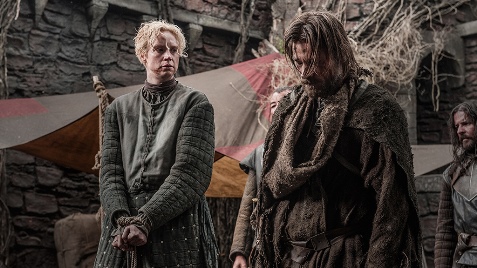
Jaime Lannister: Hero, Savior, Sympathetic Character?
Jaime Lannister isn’t nearly as innocent as Mormont, nor has he personally oppressed his captives. It would be more accurate to call his current predicament an example of how the mighty have fallen (and his enemies rising). But while Tywin rests at the helm of the enemy war effort, Jaime is, or rather was, its greatest symbol due to his skills as a warrior. In this regard he does work as an illustration of the hunter becoming the hunted. He’s able to swipe a sword and attempts to fight himself free, and he makes a fairly good go of it considering how outnumbered he is, that he’s out of shape due to being imprisoned for over a year, and most importantly that he’s fighting with his left hand. Locke and his band would all be crow food if Jaime still had his sword hand.
There’s the weak overcoming the mighty, and then there’s what’s happening to Jaime. It’s a line you simply don’t cross. Forcing him to wear his hand around his neck, laughing when he falls off his horse into the mud, tricking him into drinking horse piss—Locke is one cruel dude. It’s important to consider that Locke is in the service of Roose Bolton. What do we know about him? Not much, although one exchange he had with Robb last season spoke volumes about his character:
Bolton: In my family we say, “a naked man has few secrets. A flayed man none.”
Robb: My father outlawed flaying in the North.
Bolton: We’re not in the North.
Robb Stark: We’re not torturing them!
Roose Bolton: The high road’s very pretty, but you’ll have a hard time marching your army down it.
Bolton’s not exactly known for his kindness either, and Lockey see as Roosey do. But that’s not the impression we get when Jaime arrives at Harrenhal in “Kissed by Fire.” Locke throws Jaime down at his master’s feet and then kicks him into the mud. Bolton is not amused, quickly telling Locke to pick him up. He then notes that Jaime’s lost a hand, but Locke replies “No my lord, he has it here,” pointing to it hanging around his neck. Bolton swipes it off and tells Locke to take it away, the man smiles and says “We’ll send it to his father,” to which Bolton replies “You’ll hold your tongue unless you want to lose it.” Bolton then commands that Brienne be cut free. He even offers his apologies and tells her she’ll be under his protection now. None of this behavior seems to fit with what we’ve seen of Bolton or his general reputation. There are only two possible explanations here: The first is that Bolton is an an honorable man who has cultivated a reputation for cruelty to put fear into others and gain power, which, as we know is “a trick, a shadow on the wall” (although that wouldn’t explain the look of genuine surprise on Locke’s face when Bolton tells him to hold his tongue). The second is that Bolton’s reputation is well-earned, but he believes holding back is the smart move in the game of thrones. Smart money goes on the second answer, as when Jaime finally speaks up to ask for news of King’s Landing, Bolton details Stannis’s siege, ending with “And your sister… How can I put this? Your sister… is alive and well. Your father’s forces prevailed.” Even if Bolton believes he can benefit from treating Jaime with some semblance of kindness, he still can’t hold back from torturing him with those pauses in his speech, which no doubt lasted years from Jaime’s perspective.
In other news, these two episodes brought an enormous amount of character development for Jaime and Brienne. As the odds against them grow larger, they grow closer and closer. Brienne tells Jaime she knows he saved her from being raped by telling Locke she’s from Tarth, the “Sapphire Isle,” and he’ll be well rewarded if she’s returned unharmed (and “her honor remains unbesmirched”). So what, you say, he said a few words to prevent a woman from being raped, should we give him a trophy? No, you shouldn’t, but it’s important to note that, as Brienne reveals later, Tarth earned its nickname due to the blue of its waters, not because it’s full of sapphires. Locke and his men were uninformed enough to think the former, but Jaime received a grand education due to his status. It’s not an action that deserves a trophy, but it’s also not an action season one Jaime would have even bothered with. That Jaime Lannister would literally rather save his breath than save a “wench” from being raped.
But wait, there’s more! Jaime Lannister is known as Kingslayer and oathbreaker, he’s reviled throughout the Seven Kingdoms, men with a fraction of the honor of Ned Stark looked down their noses at him. We’ve heard him attempt to justify his actions in the past with lines like, “So many vows. They make you swear and swear. Defend the King, obey the King, obey your father, protect the innocent, defend the weak. But what if your father despises the King? What if the King massacres the innocent? It’s too much. No matter what you do, you’re forsaking one vow or another.” It all seemed like posturing and rationalization, whatever helped him sleep at night. Until the illustrious bath scene, when we finally hear the truth in a truly amazing scene between Nickolaj Coster-Waldau and Gwendoline Christie. Nothing I can say will do it justice, it speaks for itself, so I transcribed it for you. They say there’s no such thing as an incorrect opinion, but if your opinion of Jaime Lannister didn’t change after this episode, well, your opinion’s wrong. Congratulations, you’re the first person in the history of the world to have an incorrect opinion. You’re like the Neil Armstrong of sucking.
J: There it is. There’s the look. I’ve seen on face after face after seventeen years. You all despise me. Kingslayer. Oathbreaker. A man without honor. You’ve heard of wildfire?
B: Of course.
J: The Mad King was obsessed with it. He loved to watch people burn, the way their skin blackened and blistered and melted off their bones. He burned lords he didn’t like. He burned Hands who disobeyed him. He burned anyone who was against him. Before long half the country was against him. Aerys saw traitors everywhere. So he had his pyromancers place caches of wildfire all over the city. Beneath the Sept of Baelor and the slums of Flea bottom. Under houses, stables, taverns. Even beneath the Red Keep itself. Finally, the day of reckoning came. Robert Baratheon marched on the capital after his victory at the Trident. But my father arrived first, with the whole Lannister army at his back, promising to defend the city against the rebels. I knew my father than that. He’s never been one to pick the losing side. I told the Mad King as much. I urged him to surrender peacefully. But the king didn’t listen to me. He didn’t listen to Varys who tried to warn him. But he did listen to Grand Maester Pycelle, that grey sunken cunt. “You can trust the Lannisters,” he said. “The Lannisters have always been true friends of the crown.” So we opened the gates and my father sacked the city. Once again, I came to the king, begging him to surrender. He told me to…bring him my father’s head. Then he…turned to his pyromancer. “Burn them all,” he said. “Burn them in their homes. Burn them in their beds. Tell me, if your precious Renly commanded you to kill your own father and stand by while thousands of men, women, and children burned alive would you have done it? Would you have kept your oath then? First, I killed the pyromancer. And then when the king turned to flee I drove my sword into his back. “Burn them all,” he kept saying. “Burn them all.” I don’t think he expected to die. He…he meant to burn with rest of us and rise again, reborn as a dragon to turn his enemies to ash. I slit his throat to make sure that didn’t happen. That’s where Ned Stark found me.
B: If this is true, why didn’t you tell anyone? Why didn’t you tell Lord Stark?
Stark? You think the honorable Ned Stark wanted to hear my side. He judged me guilty the moment he set eyes on me. By what right does the wolf judge the lion? By what right?
B: Help, help! The Kingslayer!
J: Jaime. My name is Jaime.
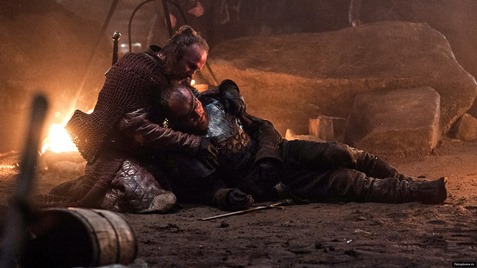
The Hound vs. The Lightning Lord
Now back to your regularly-scheduled discussion of themes. There’s no better example of the hunter becoming the hunted in these episodes than the Hound getting hounded for his past crimes by Beric Dondarrion and the Brotherhood without Banners. Alright, there’s one, the literal one, but we’ll get to that later. But there’s no better example of the downtrodden rising up against their oppressors than the Brotherhood without Banners and all that they stand for. Well, yes there is. The literal slavery of the Unsullied clearly fits better than the figurative slavery the smallfolk of Westeros live under. Anyway, the vicious Sandor, who we’ve seen kill many a man is charged with the crime of murder, but since no one can prove his guilt or innocence, he will fight Dondarrion to the death in a trial by combat to “prove his guilt or innocence.”
For those that don’t recall, in season one, Lord Beric (played by a different actor) was called upon by Ned Stark to bring the king’s justice to the “false knight” Gregor Clegane, who was sacking the Riverlands on the orders of Tywin Lannister. My how the tables have turned since then. With Ned and Robert dead, Joffrey on the Iron Throne and Tywin Lannister ruling the Seven Kingdoms behind the scenes, Gregor Clegane is now an honorable knight fighting for the good of the realm. Beric and the Brotherhood, however, have gone from king’s men to outlaws, but they continue to fight. The Hound points out that they’re fighting for ghosts, which Beric wears as a badge of honor. “That’s what we are, ghosts, waiting for you in the dark. You can’t see us, but we see you. No matter whose cloak you wear—Lannister, Stark, Baratheon—you prey on the weak, the Brotherhood without Banners will hunt you down.” In short, Beric the Brotherhood fights for the smallfolk against the oppression of the ruling class, and as a result, some of those same smallfolk have joined their ranks. Lord Beric and his band are some of the few truly egalitarian characters in the series. Sure Dany is slavery’s greatest enemy, but she still means to fight a war and install herself as queen, not hold free elections.
So in one of the best fight scenes in book or show, the Hound faces off against Dondarion and his flaming sword at the beginning of “Kissed by Fire.” It’s a close fight, but Sandor brute strength wins it as a downward thrust cuts right through Donadarrion’s sword, breaking it, and continues down through the Lightning Lord’s torso. It seems like a swift end given how much time was spent on the character’s backstory, and how intent Thoros and the others were on bringing Arya to see him. This time, the audience joins the Hound in underestimating Beric. As the Hound walks away Arya screams, “Burn in hell,” only for Dondarrion to miraculously reply, “He will, but not today.”
Which brings us to another major facet of Beric’s character, he’s found religion. Thoros of Myr is a Red Priest devoted to the Lord of Light (just as Melisandre is), and Beric, along with all his followers have converted to Thoros’s religion. For the most part, magic and the supernatural are more talked about than they are present in the world of Game of Thrones, but can be no doubt they’re there, what with the dragons, White Walkers, Melisandre seeing the future and surviving poisoned wine. Thoros brings Beric back to life after the Hound kills him. It’s the sixth time he’s died, and he’s got the scars to prove it. I’m willing to bet even the most steadfast atheists would convert to a religion if one of its priests brought them back to life six times. There’s a but to all this not being able to die business, however, there’s always a but. Beric’s been revived from death six times, but he’s not the same when he comes back, plus it’s getting harder and harder for Thoros to do. As Beric puts it, “Every time I come back, I’m a bit less. Pieces of you get chipped away.”
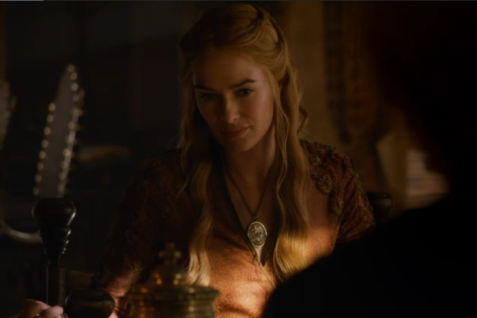
The Comedy Central Roast of Cersei Lannister
The hunter becoming the hunted theme appears in a far more figurative manner in the case of Cersei Lannister. She has a meeting with Tywin in which she demands more responsibility and power, complaining that she’s constantly overlooked because of her gender, or so she believes. She asks, “Did it ever occur to you that I might be the one who deserved your confidence of your trust? Not your sons, not Jaime and Tyrion but me. Years and years of lectures on family and legacy, the same lecture really, with tiny, tedious variations. Did it ever occur to you that your daughter might be the only one listening to them, living by them, that she might have the most to contribute to your legacy, that you love so much more than your actual children?” Tywin, in the most awesomely condescending manner possible, responds, “Alright, contribute.” Cersei goes on to gripe that the Tyrells are a problem, despite the fact that they helped defeat Stannis and saved Cersei’s life and the lives of all her children, because “Margaery has her claws in Joffrey. She knows how to manipulate him.”
That’s when Tywin breaks out the big guns. “Good,” he replies, “I wish you knew how to manipulate him.” That’s fucking boom number one. Then comes “I don’t distrust you because you’re a woman, I distrust because you’re not as smart as you think you are.” That counts as fucking booms number two and three. Why? Because that’s the exact same insult Cersei used against Tyrion back in the season premier. Tywin goes on to say, “You’ve allowed that boy to ride roughshod over you and everyone else in this city,” which we’ll call fucking boom number four. This is everything I’m sure most every viewer has wanted to scream at Cersei every time she acts like the sharpest tool in the shed or claims her gender, not her incompetence, is the only reason she hasn’t been given more power. Let’s also note that the underestimation theme is subverted in this scene. First in Cersei’s enormous overestimation of her abilities and Tywin’s frank explanation of how those “abilities” appear in reality.
Cersei’s roasting (or being hunted) continues in “Kissed by Fire.” She takes absolute delight in watching as Tywin informs Tyrion he is to wed Sansa Stark to prevent the Tyrell plot of wedding her to Ser Loras, and grant them the key to the North. Of course, she’s not excited about her brother’s engagement as a normal sister would be, she’s simply there to see Tyrion squirm and enjoy his discomfort and futile counterarguments. Or so she thinks. Just when she reaches the peak of her ecstatic enjoyment of her brother’s torment, Tywin turns to reveal she too will be wed, and to none other than Ser Loras Tyrell. It’s a table turning on a number of levels. There’s the obvious: the very thing she enjoys watching her brother suffer through happens to her as well. But there’s also the way Tywin is using her own words against her. She said herself that the Tyrells are a problem, and wedding her to one will solve it. Like Tyrion, she hopelessly tries to talk her way out of it, but this is Tywin Lannister she’s arguing with. There is no victory to be had.
A Few More Things:
There were quire a few more fantastic plotlines in these two episodes, but I’m nearing four thousand words here, so I’ll attempt to relate them to the aforementioned themes in a single paragraph. The ever-scheming Littlefinger is out-schemed when it’s revealed Ros is playing informant for Varys—which is also an example of a character underestimating another. We also get a Varyzation of the hunter becoming the hunted as Varys has the sorcerer who removed his testicles in a box. Tyrion can only hope to be as successful as Varys in seeking justice for the attempt on his life by a member of the Kingsguard—likely ordered by his sweet sister Cersei. Sansa tries to rebel against her oppresors by seeking to escape King’s Landing either secretly with the Littlefinger’s help or through the Tyrell plot to marry Loras. Finally, Theon, who unsuccessfully hunted the younger Stark boys (but settled for slaying a couple of orphans) literally plays out the most dangerous game when he escapes captivity with the help of a character whose name remains unknown only to end up right back where he started. Speaking of that unnamed character, he claims to be a commoner, yet he clearly refers to Theon as “my lord,” not “m’lord.” Let’s not forget Arya and Tywin’s conversation from last season.
Again, apologies for the lateness. I’ll be back tomorrow with a review of tonight’s episode.
Related Posts
Posted in: Television
Tags: Anguy the Archer, Arya Stark, Barristan Selmy, Beric Dondarrion, Brienne, Brienne of Tarth, Brotherhood without Banners, Cersei Lannister, Commander Mormont, Craster, Daenerys Targaryen, Dolorous Edd, Game of Thrones, Game of Thrones blog, Gendry, Gilly, Grenn, Grey Worm, Jaime Lannister, Jorah Mormont, Kraznys, Locke, Nate Kreichman, Night's Watch, Qyburn, Rast, Robb Stark, Roose Bolton, Samwell Tarly, Sandor Clegane, The Hound, Thoros of Myr, Unsullied








